- Home
- Joel Rosenberg
The Silver Stone Page 6
The Silver Stone Read online
Page 6
“Okay, okay,” he said, clenching his hands into fists. “I’ll tell him. We’ll do it your way.”
She pulled back. “Thank you,” she whispered, her voice barely above a trembling murmur.
She didn’t seem to notice that he was trembling like a leaf.
Ian strode back into the fencing studio, trying to make himself stop shaking.
Idiot, he thought to himself, the idea of crawling through a Hidden Way between worlds doesn’t frighten you, and you’re half falling apart because a pretty woman grabbed you. If she’d kissed you, you’d probably have pissed yourself.
Shut up, he told himself. Save it for later.
“Karin makes a good point,” he said, that if a pretty woman in a short robe cries on my shoulder, I’ll do whatever the hell she says, “that there are some problems in bringing Thorian along.”
He was making it all up as he was going along, but nevertheless, it sounded right. “With him as part of the party, we’re automatically in trouble with the House of Steel, and even if Thorian del Orvald wants to help out the friend of his grandson—and he might want to; he seemed to like Torrie—he’s still the Duel-master. He’s still got to send his men after Thorian the Traitor.”
Thorsen opened his mouth, then closed it, then opened it again. “You’ve spoken of traveling to Harbard’s Landing, not to the Cities of the Middle Dominions.”
“And if we can’t find what we need at Harbard’s Landing?” Ian shook his head. “No. And then there’s the matter of the Sons of Fenris. They’ve visited here once, and—”
“That was a surprise. It wouldn’t be, not again.” Arnie Selmo’s lips twisted. “I don’t think anything’ll get past Davy Larsen and his partner, not right now. And we are keeping watch—”
“But only on an entrance that you know,” Ian said. “There’s an entrance to the Hidden Ways right under your feet that you don’t know about, that none of you would ever have known about if Hosea hadn’t shown me.” Entrances tended to keep themselves hidden; it was part of their nature. Unless you knew where to look, and intentionally looked there, you would find yourself making an excuse to look elsewhere, and never know it.
Ian had expected an argument, but Thorian Thorsen drew himself up straight.
“As you would have it,” Thorsen said. “But I—”
“Besides,” Ivar del Hival said, quietly, leaning over toward Thorian Thorsen, “it’s the champion’s to decide, not yours, old friend.” He drew himself up straight as he turned to Ian. “Will you have me as your companion, Ian Silverstone? You’ll need another pair of hands to carry the other side of the stretcher, at least.”
Ian nodded. “I was hoping you’d volunteer.” He would have liked to have Torrie with him, either instead or in addition, but so be it; there was no time to waste. He turned to Doc Sherve. “Shoot him full as you can of whatever you think he ought to have,” he said. “And do you think I ought to take anything with me?”
“Drugs?” Sherve smiled crookedly. “My license is limited to North Dakota. We don’t exactly have reciprocity with Tir Na Nog,” he said. He shrugged. “I know things work differently there, but how? Will Valium be more likely to suppress respiration, or less? How effective would Tegretol be?” He had opened his bag and had started to remove items, then sighed. “Shit,” he said, as he started to replace them. “In for a penny, in for a pound. Take it all. Better you have stuff you can’t use than you don’t have what you need.” He closed his doctor’s bag, latched it, and held it out. “Use the Merck manual and your best judgment.”
“Take me,” Arnie Selmo said, quietly.
Ian turned, shocked.
“Take me,” Arnie repeated. “My pharmacist’s license is out of date, but Ephie and I ran Selmo’s Drugs for more years than I care to think about. I’m no young buck, but I don’t wear glasses, and I can still walk the legs off most men, and there might be something to having somebody expendable watching your back.”
“Huh?” Ian didn’t understand. “Expendable? Who is expendable?”
Arnie looked him in the eye. “I am,” he said, quietly. “Have been, for—shit, boy, I could tell you how many days it’s been, but you never had the—” He stopped himself, then started again, his voice low and husky. “But you never knew her, and it wouldn’t mean anything to you,” he said. “I’m tougher than I look, and I didn’t promise her not to…” He closed his eyes for a moment. “I didn’t promise her not to do this. For something worth doing, I’m as expendable as a piece of Kleenex.” He looked over at Thorsen. “I’m about your boy’s size, if a bit narrower in the shoulders. You think he might have something that could fit me?”
Tilted on its side on hidden hinges, the fencing strip was a too-long door, opening into blackness.
Not darkness. No trace of a probing flashlight beam bounced back.
Ian finished bolting the pulley to the overhead beam, then checked the knots on the improvised sling that would hold Hosea’s stretcher. Ian remembered the demonstration Hosea had given him; this entrance would only go one way.
Had Hosea found it here or made it here? Ian hadn’t thought to ask, then, and it hadn’t come up since. He should remember to ask, later.
He took a piece of inch-thick dowel stock from a bin by the workbench and poked one end into the darkness.
It slid into the blackness silently, but when he pulled it back, the part that had gone into the darkness was gone. Ian held up the end. It had been cut cleanly, at an angle, leaving the dowel with an oval end as smooth as the finest sandpaper could have left it.
Eyes widened as he looked from face to face. “Don’t hesitate, either of you. And for God’s sake, don’t hesitate when you drop Hosea through.” He tried to visualize it. “The hole only goes one way—any rocking that sends part of him back up will slice off what’s through. Don’t try to lower him or anything. Just steady him over the opening, then drop him right through; we’ll catch him.”
Ian’s mouth was dry and tasted of salt and iron, but he forced a calm smile. That was one thing that the Fire Duke had taught him: it was just as easy to do something dangerous with style and bravado as it was to do it knock-kneed and trembling.
He drew Giantkiller slowly, and brought the sword up in a quick salute, then sheathed it with a loud snap, and stepped off, into the darkness.
Chapter Four
Another Homecoming
Torrie and Maggie were having a final drink in the lobby of the Algonquin when he had the trouble with his American Express card.
It was strange to feel so comfortable here. Torrie had never thought that he could possibly have the feeling of homecoming in—shudder—New York City. Yechh.
But he did. It was nice to be able to read the headlines on a newspaper or the label on a tube of toothpaste; it was a treat to be able to get into a taxi and let it be the problem of the Iranian in the front seat to figure out what Torrie said. It was nice to be able to plug in his razor, to know exactly what it was that sidewalk vendors were selling, to think of a policeman walking down the street as friendly instead of hostile.
He liked the professionally genial staff of the Algonquin, although after the sullen surliness that passed for service in Paris—a surliness that had been tinged by more than a trace of contempt when Torrie had trotted out his high-school French—he probably would have liked any American hotel.
It was wonderful to be home, even if the substitute home was that grimy, crowded, noisy, crime-ridden icon called New York City.
A couple of days here, a quick stop in St. Louis—Torrie was not looking forward to meeting her parents, but Maggie was insistent on the subject, and it was in the long run better to humor Maggie than to argue with her—and then home for a couple of weeks before school started up.
Which was another problem entirely. School or Tir Na Nog? In the long run, of course, the answer was Tir Na Nog. His father and Uncle Hosea had been training him for his entire life for that, even if they had never quite admitted it to t
hemselves, and even if Dad would never for the life of him have sent his son off after the Brisingamen jewels.
Was there more important work than making sure they got into safe hands? No; it simply wasn’t possible.
“Eager to get back?” Maggie asked.
“Well, yeah.” He nodded. A small-town kid never quite loses it, he decided, the expectation that everybody you run into is somebody you know, and that people you don’t know are strangers, the word laden with overtones of alien and different. And New York was full of strangers. “Be it ever so humble, and all that.”
She snickered. “Yeah, right. Humble.” She had seen the Thorsen house. Not a showy place, but a deucedly comfortable one. It was amazing what a lot of work and a lot of money could do, even when you were constrained to not make it showy.
He smiled. “Okay. But it’s mainly that it’s familiar, okay?”
“Well, country boy, if you were to take your feet out of the furrows every now and then and put your nose in a book, you might learn enough about other places to feel comfortable in them. Like here, say.”
“Here, say, is the lobby of a hotel. It’s nice, but…” It was light and airy, and an airflow coming from the direction of the hotel restaurant brought a trace of beef and garlic, but it was still a hotel lobby.
“This isn’t just any hotel. This is where the Algonquin Round Table used to meet, every day,” Maggie said, probably for the dozenth time, as she sat back in her chair and looked at him over her Virgin Mary. She had offered Torrie a taste, but he had passed; if it was hot enough for Maggie Christensen, it was too hot for him. Where the girl had gotten her taste for pepper was a mystery to him; it wasn’t like Maggie was from New Orleans or somewhere near what a Texan friend of Torrie’s always called the “Meskin” border.
“You’ve mentioned that.” Torrie shrugged. “Not a big deal to me.”
“Robert Benchley, James Thurber—”
“The cartoon guy?” he asked, mainly to tease her. He enjoyed playing the uneducated hick at times.
“—Dorothy Parker not a big deal?” she asked. He couldn’t tell whether or not her indignation was slight and real or faked—Torrie had never quite figured Maggie out, and probably never would.
“Dorothy Parker?”
Her mouth pursed into a frown. “You know:
“ ‘Oh, life is a glorious cycle of song, ” ‘A medley of extemporanea;
“ ‘And love is a thing that can never go wrong; ” ‘And I am Marie of Roumania.’ ”
He sipped at the bottle of Sam Adams, ignoring the glass near him. “Cynicism looks cute on you.” Hell, everything looked cute on her. Even now, although she was dressed sensibly for travel in an oversized navy raw silk shirt over a cotton tee and leggings, her hair, now grown shoulder-length, pulled back into a bun that she tucked under the black beret she had bought from a street vendor in Paris.
Torrie had idly picked it up from a nightstand a few days later, and noticed that the tag read “Made in the Philippines.” Rather, it had read that way—a few cuts from the tip of the sharp knife blade of the SOG Paratool that Torrie always carried had taken care of that problem.
Better to protect an illusion or two than disappoint Maggie over something trivial; Torrie valued kindness over truth.
Torrie beckoned for the waiter, then handed over his American Express card. He had relied on cash and traveler’s checks, which he had bought for cash before leaving the country—it was a Thorsen family habit to avoid leaving a paper trail whenever possible—but carrying too much money might have drawn unwanted attention at any port of entry, and he had stretched out the money supply by using his credit card for things that would have left a paper trail anyway, like paying for hotels. Keeping family money as a private matter was something he had been raised to do, and only recently had it been explained to him why it was necessary. The last thing Mom and Dad needed would be for some busybody at, say, the IRS, to look into the origin of the Thorsen family fortune, and while Mom had carefully laundered almost all of it over the years—and multiplied it severalfold by careful investing and trading—it was best to keep a low profile.
Particularly now, particularly since Torrie and Ian had dumped close to a million dollars’ worth of gold on her, in the form of golden coins hauled back in their packs from the Middle Dominion City of Falias. It would take years for her to safely turn all that into cash and investments—if she was left in peace.
Still, Torrie thought with a smile, it wasn’t just any twenty-year-old who was able to split his share of a million dollars with his girlfriend, and not worry about it.
Mom and Dad’s money made that possible, and while Mom clearly hadn’t liked the idea, Dad couldn’t have cared less. He hadn’t gotten over all of his upbringing, and couldn’t see money matters as something that properly ought to concern a man.
That was a nice thing about being brought up by a father of Middle Dominion origins.
“Excuse me, Mr. Thorsen?” The waiter was back, a look of studied casualness written across his face. “There appears to be a small problem with your credit card, sir.”
Torrie didn’t quite snort. Sure, they had been gone for months, and sure, there had been a couple of bills during that time—the credit card people billed monthly, didn’t they?—but Mom would have paid it, on the day it was due, neither one day earlier (no sense in giving up even a tiny bit of interest) nor later (always best to have a perfect credit rating).
“Really.” Maggie leaned forward. “They declined your credit card?”
“Nonono, sir,” the waiter put in quickly. “When I put your charge through, a code came back to call American Express, sir. The supervisor asked me to emphasize that they were approving the charge, and that there’s nothing whatsoever wrong with your account, and that they’re sorry to disturb you, but that she would like to speak to you.” He gave a professional smile.
Maggie frowned. Torrie got to his feet. He didn’t like this at all. He forced himself to keep to the waiter’s leisurely pace as he followed him across the thick carpet of the lobby, and to the front desk.
An old-style rotary phone lay there, the receiver off the hook.
“Hello?” Torrie said.
“This is Madeleine Alessi; I’m a supervisor at American Express customer services. Am I speaking with Thorian Thorsen?” a woman’s voice asked.
“Yes. That’s me.”
“Purely for purposes of identification,” she went on smoothly, “could you please give me your mother’s maiden name?”
“Roelke,” he said. “R-O-E-L-K-E. Now, what’s going on, please?”
“There’s nothing wrong with your account, sir—it’s entirely current—I apologize for bothering you. But we have been asked by a man identifying himself as your father to ask you to call home immediately, on a matter of some family emergency—your Aunt Jen has been taken to the hospital, he said.”
“Thank you. I’ll do that immediately.”
“Thank you for using American Express.”
Shit. Torrie hung up the phone and hurried across the lobby toward the bank of pay phones.
He didn’t have an Aunt Jen, or any aunts or uncles at all. Uncle Hosea wasn’t his uncle; his mother had been an only child, and as far as he knew, his father’s family consisted only of Thorian del Orvald and his wife.
But he understood the “call home” part.
His fingers were already dialing, punching up MCI and then his home number. His mother answered it on the third ring. “Hello?”
“Torrie here, Mom. What’s going on?”
She was silent for so long that Torrie opened his mouth, about to ask if she was still on the line.
“It’s kind of… complicated to talk about over the phone.”
It was a rule that you didn’t discuss Family Business over the phone. “Anything I can do?”
Again, a long pause. “You can come home as soon as possible.”
He nodded. “Okay.” Then a thought hit him. Two thou
ghts, in fact. “Can I talk to Dad?”
No pause this time. “Certainly.”
His father was on the line almost instantly; clearly, he had been waiting by the phone. So much for the worry that his father had vanished.
“Yes,” Dad said.
“Havadh er derein isti vejen?” Torrie asked, then continued in Bersmal: “Is there some danger?”
“No,” Dad said in the same language. “Not for us, here, now. If there were a knife held, say, to your mother’s throat, surely her captors would not let me mention it, not even in Bersmal, an’ they spoke it.” Torrie heard a chuckle; he wasn’t sure whether Dad was amused or impressed. “But there have been some difficulties with Hosea, and he and a friend of yours have left.”
Left? That meant—“Shit,” Torrie said. Ian was impulsive, sure, but Uncle Hosea was anything but that.
It must have been awfully important. “Okay, we’ll grab the next plane out,” Torrie said. “Can you pick me up in Grand Forks?”
“Call when you know when your plane lands; you’ll be met. Is there anything more we need discuss now?”
“I don’t think so.”
There was a click on the other end. Dad had been raised in a society where saying good-bye was a matter requiring some formality. Twenty years in Hardwood had made some changes, but he had never quite gotten the idea that any leave-taking convention could possibly apply to something as strange, artificial, and exotic as a telephone call.
Maggie was at his side as he hung up the phone. “What’s going on?” she asked.
“Ian and Hosea have left,” he said, quietly.
“Left, as in—” Her eyes got wide. “Oh.”
“My father wants me home immediately.” Which meant that Dad either wanted to hare off after them, or wanted Torrie to. No question which way made more sense: Dad could protect the home front better than Torrie could, and Torrie’s head wasn’t wanted by the House of Steel. Dad was protective, but that applied to Mom as much as it did—no, more than it did—to Torrie, and Dad was nothing if not sensible.
“Us,” Maggie said, looking thoughtful. “I’ll have to figure out some story to tell my parents, but…”

 The Road Home
The Road Home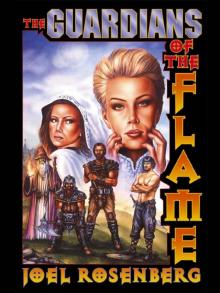 The Sword and the Chain
The Sword and the Chain Not Quite Scaramouche
Not Quite Scaramouche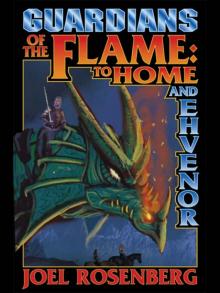 Guardians of The Flame: To Home And Ehvenor (The Guardians of the Flame #06-07)
Guardians of The Flame: To Home And Ehvenor (The Guardians of the Flame #06-07)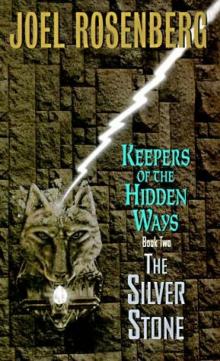 The Silver Stone
The Silver Stone Hero
Hero Not For Glory
Not For Glory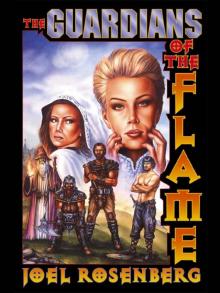 The Sleeping Dragon
The Sleeping Dragon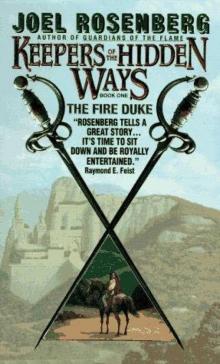 The Fire Duke
The Fire Duke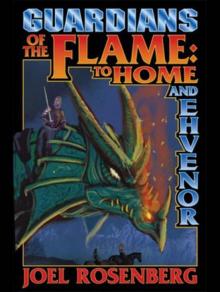 Guardians of The Flame: To Home And Ehvenor (Guardians of the Flame #06-07)
Guardians of The Flame: To Home And Ehvenor (Guardians of the Flame #06-07)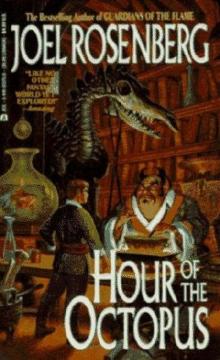 Hour of the Octopus
Hour of the Octopus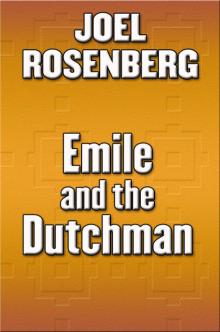 Emile and the Dutchman
Emile and the Dutchman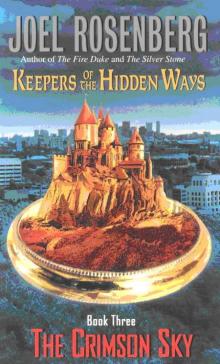 The Crimson Sky
The Crimson Sky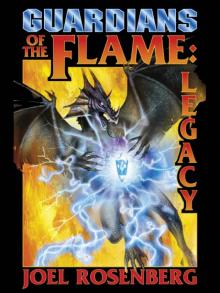 Guardians of the Flame - Legacy
Guardians of the Flame - Legacy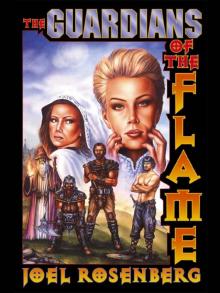 The Silver Crown
The Silver Crown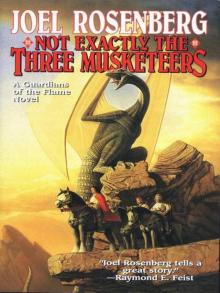 Not Exactly The Three Musketeers
Not Exactly The Three Musketeers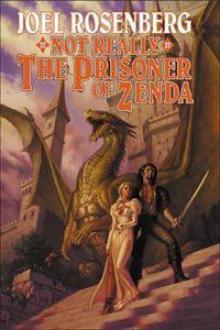 Not Really the Prisoner of Zenda
Not Really the Prisoner of Zenda